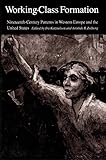Working-Class Formation : Ninteenth-Century Patterns in Western Europe and the United States / ed. by Aristide R. Zolberg, Ira Katznelson.
Material type: TextPublisher: Princeton, NJ : Princeton University Press, [2021]Copyright date: ©1987Description: 1 online resource (482 p.)Content type:
TextPublisher: Princeton, NJ : Princeton University Press, [2021]Copyright date: ©1987Description: 1 online resource (482 p.)Content type: - 9780691228228
- Working class -- France -- History -- 19th century
- Working class -- Germany -- History -- 19th century
- Working class -- United States -- History -- 19th century
- POLITICAL SCIENCE / History & Theory
- Activism
- Agriculture
- Anti-Socialist Laws
- Apprenticeship
- Aristocracy
- Artisan
- Bourgeoisie
- Capitalism
- Class conflict
- Class consciousness
- Collective action
- Collective bargaining
- Decentralization
- Division of labour
- Domestic worker
- E. P. Thompson
- Economic development
- Economic growth
- Eight-hour day
- Emigration
- Employment
- Factory system
- Factory
- Government
- Handicraft
- Household
- Ideology
- Immigration
- Industrial Revolution
- Industrial Worker
- Industrial production
- Industrial relations
- Industrial society
- Industrialisation
- Industry
- Institution
- Journeyman
- Labor aristocracy
- Labor history of the United States
- Labor relations
- Laborer
- Labour movement
- Legislation
- Local government
- Major party
- Manual labour
- Manufacturing
- Martin Shefter
- Marxism
- Mass movement
- Mass production
- Mechanization
- Middle class
- Militant (Trotskyist group)
- Party leader
- Peasant
- Political alliance
- Political machine
- Political party
- Political science
- Political spectrum
- Politician
- Politics
- Proletarianization
- Protest
- Prussia
- Putting-out system
- Radicalism (historical)
- Reformism
- Republicanism
- Salary
- Skilled worker
- Social class
- Social democracy
- Social history
- Social movement
- Social structure
- Strike action
- Suffrage
- Sweatshop
- Syndicalism
- Tariff
- Tax
- Textile industry
- The Making of the English Working Class
- Trade association
- Trade union
- Tradesman
- Unemployment
- Union Movement
- Universal suffrage
- Urbanization
- Voting
- Wage slavery
- Wage
- Welfare
- Workforce
- Working class
- Workplace
- World War I
- 305.5/62/094 19
- HD8430
- online - DeGruyter
| Item type | Current library | Call number | URL | Status | Notes | Barcode | |
|---|---|---|---|---|---|---|---|
 eBook
eBook
|
Biblioteca "Angelicum" Pont. Univ. S.Tommaso d'Aquino Nuvola online | online - DeGruyter (Browse shelf(Opens below)) | Online access | Not for loan (Accesso limitato) | Accesso per gli utenti autorizzati / Access for authorized users | (dgr)9780691228228 |
Browsing Biblioteca "Angelicum" Pont. Univ. S.Tommaso d'Aquino shelves, Shelving location: Nuvola online Close shelf browser (Hides shelf browser)
Frontmatter -- Contents -- Preface -- Introduction -- 1. Working-Class Formation: Constructing Cases and Comparisons -- Part One. France -- 2. Artisans, Factory Workers, and the Formation of the French Working Class, 1789-1848 -- 3. On the Formation of the French Working Class -- 4. The Distinctiveness of Working-Class Cultures in France, 1848-1900 -- Part Two. The United States -- 5. Becoming American: The Working Classes in the United States before the Civil War -- 6. Trade Unions and Political Machines: The Organization and Disorganization of the American Working Class in the Late Nineteenth Century -- Part Three. Germany -- 7. Problems of Working-Class Formation in Germany: The Early Years, 1800-1875 -- 8. Economic Crisis, State Policy, and Working-Class Formation in Germany, 1870-1900 -- Conclusion -- 9. How Many Exceptionalisms? -- List of Contributors -- Index
restricted access online access with authorization star
http://purl.org/coar/access_right/c_16ec
Applying an original theoretical framework, an international group of historians and social scientists here explores how class, rather than other social bonds, became central to the ideologies, dispositions, and actions of working people, and how this process was translated into diverse institutional legacies and political outcomes. Focusing principally on France. Germany, and the United States, the contributors examine the historically contingent connections between class, as objectively structured and experienced, and collective perceptions and responses as they develop in work, community, and politics. Following Ira Katznelson's introduction of the analytical concepts, William H. Sewell, Jr., Michelle Perrot, and Alain Cottereau discuss France; Amy Bridges and Martin Shefter, the United States; and Jargen Kocka and Mary Nolan, Germany. The conclusion by Aristide R. Zolberg comments on working-class formation up to World War I, including developments in Great Britain, and challenges conventional wisdom about class and politics in the industrializing West.
Mode of access: Internet via World Wide Web.
In English.
Description based on online resource; title from PDF title page (publisher's Web site, viewed 27. Jan 2023)









